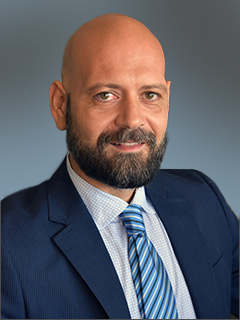2019 ASHFoundation New Century Scholars Research Grant Recipient
Clearing a Path
 Imagine being a student in a noisy classroom and not being able to fully hear your teacher. At the same time, imagine being a teacher in that exact noisy classroom having to keep your voice elevated to unhealthy levels to (hopefully) ensure all your students can hear you. It’s a situation where no one wins, and Pasquale Bottalico wants to see that change. Through his research, Bottalico, an associate professor in the Speech and Hearing Department at the University of Illinois, is looking to create a blueprint for the future of classroom acoustics. And with the help of the funding he received as a recipient of the 2019 ASHFoundation New Century Scholars Research Grant, he is well on his way.
Imagine being a student in a noisy classroom and not being able to fully hear your teacher. At the same time, imagine being a teacher in that exact noisy classroom having to keep your voice elevated to unhealthy levels to (hopefully) ensure all your students can hear you. It’s a situation where no one wins, and Pasquale Bottalico wants to see that change. Through his research, Bottalico, an associate professor in the Speech and Hearing Department at the University of Illinois, is looking to create a blueprint for the future of classroom acoustics. And with the help of the funding he received as a recipient of the 2019 ASHFoundation New Century Scholars Research Grant, he is well on his way.
“Currently, in the United States, when it comes to classroom acoustics, the guidelines consider only one acoustical parameter – the reverberation time,” explains Bottalico. “My goal is to create guidelines that take into account both the teachers and the students in the way we view and design classroom acoustics.”
Bottalico’s interest in acoustics began with his passion for performing opera. Growing up in Italy, he remembers his house being filled with music and singing in the evenings. He later joined his high school choir where he showed promise and ultimately went on to receive a degree in opera singing at the F. Cilea Music Academy of Reggio Calabria, notably while also earning a bachelor’s degree in telecommunications engineering. It was later when he was searching for a thesis topic for his master’s degree in telecommunications engineering that he found the perfect opportunity to study a topic that blended his love of music with his engineering sensibility: acoustics.
“The initial studies of theater acoustics were focused on the audience. However, performers need to clearly hear themselves to be able to perform at their best,” Bottalico explains. “This is particularly important for voice in opera. It is not just open your mouth and sing. You need to meet some targets in terms of production, loudness, pitch, and quality of the sound. And for me, with my engineering background, yes, I can hear. Yes, I can feel, but I also want to see, and I also want to measure what is coming out and quantify if what is coming out is correct. It was a sign from somewhere that this is what I needed to learn more about.”
As his curiosity grew, he kept exploring. Although not a speech-language pathologist, he began reading more and more about voice research, even reaching out to the National Center for Voice and Speech for resources. Eventually Bottalico’s research not only brought him to the United States, but also to the field of speech-language pathology and its connection to voice. This perspective fueled his new application for his research: classroom acoustics.
“In early evaluations of communication in the classroom, researchers completely ignored the speakers because they assumed that everyone has a normal voice quality. But that's not the case with teachers. There are studies that show almost 60% of teachers are experiencing voice problems. That, combined with poor classroom acoustics, can create extra vocal load.”
It's that extra vocal load Bottalico is trying to establish and quantify¾that’s where the ASHFoundation’s support stepped in. With the help of the funds he received, he and his team are going into classrooms and conducting studies to determine what effect a teacher’s voice problem has on their students’ performance.
“We are not only finding that a voice problem increases teachers’ vocal load, but it also negatively affects the students,” says Bottalico. “In a typical classroom, students are trying to understand speech in a relatively noisy environment. There are many different auditory inputs. In this setting, some of the cognitive power that should be focused on learning is used to segregate speech from noise. And this cognitive loading problem is only intensified when a teacher has a voice problem.”
Bottalico learned about the resources available from the ASHFoundation after he applied to and participated in ASHA’s Lessons for Success program. In 2019, he applied for and received an ASHFoundation New Century Scholars Research Grant for his proposal, “Classroom Acoustics for Enhancing Students' Understanding When a Teacher Suffers From Voice Problems.” And now, looking ahead, Bottalico and his team have applied to the National Institutes of Health for further funding to continue their research.
“We are so excited about what we are learning, and it was such a stroke of luck to learn about the ASHFoundation’s programs,” says Bottalico. “I really want to see these changes in place when we approach classroom design in the future. We need to create an environment that allows teachers and students to have the best communication experience possible.”
VIEW MORE RECIPIENT SPOTLIGHTS